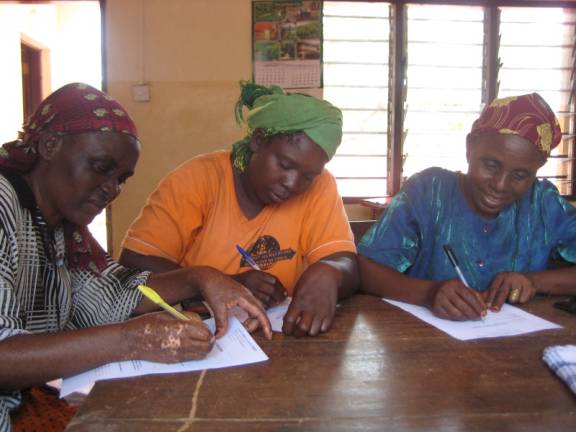|
Investing in grassroots women invests in a community . . While the endless sisal fields lining the road through Vitengeni ward in rural Kenya may seem like the most remarkable component of this vast area of land at first glance and a corporationís dreamland for investment, CWID staff finds that the women of Vitengeni ward, Kilifi District may actually be a more worthwhile investment. Since empowering rural women economically is one CWIDís core objectives, on 30 April 2010, CWIDís Communications officer Lorine Awuor and CWIDís Intern Gillian Stoddard Leatherberry traveled to the Vitengeni ward in rural Kenya to visit one of the groups we work with and who have received the CWIDís micro credit loans about how the loans have helped improve their lives. In Vitengeni, CWID invests in female business entrepreneurs using micro credit loans that help them start a small business to support themselves and their families. At the site, CWID staff talked to Ten women who had applied for a joint microfinance loan from CWID and had successfully started small businesses with the money. The loans are given to women every Twelve months, who then use the money to jumpstart their businesses and then pay all of the money back with 10% interest within twelve months time. As women pay back the loans with the interest, more loan money is available for another woman to take out a loan or for women already in the program to take out larger loans. While we were visiting the women, they all filled out the applications forms for the next 12 months. The applications were in English, but these grassroots women filled out the forms and understood them perfectly, despite the fact that these women will speak their mother tongue or Kiswahili all the time at home, only using English when visitors come to Vitengeni, which is not very often. CWID intern Gillian found their ability to work with not one or two, but three languages truly impressive, especially as she struggles to learn Kiswahili while staying in Kenya! Women group filling the micro credit forms for loans in vitengeni CWID Microfinance Participants Women had come from their businesses in town on what happened to be market day to talk to CWID staff. The women we spoke to told us that the loans they had received so far had helped improve their businesses. Here is what the CWID microfinance participants had to say: Zawadi Dzila
Why grassroots women? The development issue in regions such as Vitengeni isnít lack of commitment by people to find jobs, but rather the fact that there are simply no jobs, especially for women who have often received relatively less education than men in their area. These women are expected to provide for their families in addition to bearing responsibility for the domestic work at home. If Kenyaís Members of Parliament had the same work ethic as these women, Kenya might just be the next world super power! CWID staffís experience at Vitengeni highlighted the value of investing in grassroots women who help sustain their families and bring change to their entire communities by being examples to young girls in the area, most who will face similar employment deficits later in their lives. Recommendations: Investing in grassroots women supports not only a woman, but sustains a community. Grassroots women are often neglected in development work as many organizations find it difficult to venture out to rural areas, despite the fact that these women travel to Mombasa once a week with fewer staff members and resources than many NGO groups working in development. CWID believes that reaching out to grassroots women is one of the best investments, as well as being one of the most rewarding. CWID is proud to support the work of grassroots women. |
